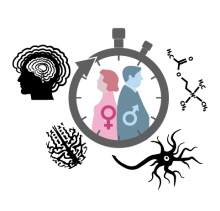- About us
- Research
- Students & Teaching
- Seminars & Events
- Directories
- Booking Rooms & Equipment
- עברית
Home » Prof. Hermona Soreq reveals sex-related differences in patho-mechanisms related to bipolar disorder and schizophrenia
Several findings indicate sex-related differences in bipolar disorder and schizophrenia:
Despite growing evidence related to these gender-related differences, patients of both genders receive the same medical treatment.
To address this issue, the Soreq team has recently conducted for the first time, a sex- and cell type-specific examination of RNA transcripts in post-mortem patient brain samples. RNA transcripts from men and women brains with either disease were compared to controls.
Acetylcholine-related genes such as acetylcholinesterase and the microRNAs targeting it came up as highly divergent between men and women patient brains. Growing cell lines of neuroblastoma origin from male and female showed similar differences.
Also, single cell transcript profiles from acetylcholine-producing cortical neurons showed that they react to interleukin 6, a different inducer than the nerve growth factor activating the cholinergic neurons in deep brain nuclei.
These findings support contributions of sex-related differences to patho-mechanisms related to bipolar disorder and schizophrenia, calling for developing sex-related differential therapeutic treatment of these disorders.
Moreover, the newly developed pipeline and analysis approach are readily amenable for adaptation for studying other transcriptional pathways and finding new sex-related biomarkers and therapeutic targets in many different diseases, for the benefit of both women and men.
